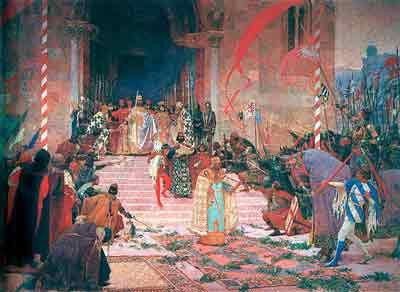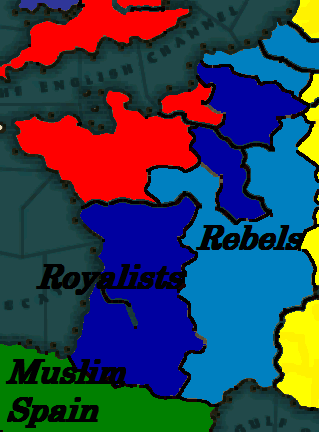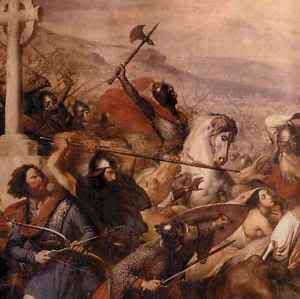Deamon: Well I couldn't find any better picture for the given situation. Although I must admit when one looks at it a bit longer it does seem quite ridiculous. Anyway good to have you on board again.
Anyway good to have you on board again. 
Kurt_Steiner: After this war it definitely looks like the Isle will need some time to recover. Whether England will ever recover it's dominant position however seems highly doubtful.

The Cast:
Ranald I, King of Scotland, Ireland and Wales
Robert Loarn, Earl of Morray
Edmund MacBrannain, royal councilor
Emma Capet, daugther of Geoffroy I of France
Catherina of Atholl, sister of Ranald I
Louis Capet, duke of Blois, uncle of Geoffroy I
The end of the war with England had come not a second to late for Scotland. Vast stretches of countryside where destroyed and commerce had been disrupted for years leaving many once prosperous trade places deserted and in decay. Furthermore the crown itself was virtually ruined. The grand expenses of the war, most of all the hiring of soldiers and mercenaries and keeping them in the field for so great an amount of time, combined with greatly declining sources of revenue had lead to an accumulation of debts on an unimaginable scale. The royal treasury had resorted to the common way of repaying loans by granting certain taxes and tools away for a certain time to it's debtors. In wartime this however was a policy of dubious quality since it reduced the crowns income even further. Therefore although already having granted away vast taxation rights for several years the crown at the end of the war still had some 200.000 Pounds of debts to repay. Faced with these enormous figures the council quickly came to the conclusion that extraordinary taxation was the only cure for this remedy. For this reason parliament was summoned to Edinburgh for July 1149.

The session opened on 23 August with the Lord Treasurer Sir Collin Bruce delivering the opening address in the name of the king (this is by the way the first time chronicles mention a member of the Bruce family which would later feature so prominently in Scottish history). He called for parliament to give a subsidy on form of a 8th so that the grave damages of the war might be removed, order restored and thereby peace and prosperity return to the realm. The need for ready cash was especially stressed since there where reports of great insurrections in the Kingdom of Ireland, which would be lost if firm action was not quickly taken (in the end it would turn out that the rumors about an Irish uprising where greatly exaggerated and no serious threat to Scottish rule). It was then the turn of Lord Robert Loarn, earl of Morray, to give a formal reply for the lords assembled. It was one that surly did not please the crown. He began by thanking his "most dreaded sovereign" and his ministers for their glorious and swift conclusion of the war but rejected the crowns request for a subsidy as both "against the ancient customs and laws of this realm" and "indecent". While he expressed sympathy for the financial plight of the monarchy he pointed out that he and his peers where no less effected by the war. He famously concluded that it was against the laws of nature and God that "he who rules should prosper, while his subjects are left destitute". This speech according to legend infuriated the 14 year old Ranald so much that he personally replied to it in a passionate way pointing out that great part of the realm such as the Scottish Highlands or the Welsh Marches had been left completely unaffected by the conflict. Had he so often risked his personal security to face such ingratitude of his own subjects? He would have rather fallen in the struggle of a lost cause rather than to have to witness such a betrayal by his own people as a victor. Whether it was this speech which shamed the Lords into a new position or some backroom deal we do not know, but in the end parliament agreed though not to grant a 8th but at least a 10th as subsidy.
With the financial freedom of the crown thereby more or less restored again the next two years went without any major recored event. The next major event to occur was the death of the kings younger brother Ruadrí, Duke of Connacht in 1151. With his death his lands fell back to the king but since the crown lacked the necessary means to exploit them effectively the question who to grant these lands at once became imminent. On this issue it can also be said for the first time that Ranald, by now 16 years old, although on the paper still under the guidance of his regency, took his own line on the issue and managed to have his will. While most in the council favored carving up the estates between various magnates of the realm Ranald on his own initiative invested Edmund MacBranain, a faithful noble councilor and friend his late father Malcolm IV, with all the lands and honors of a Duke of Connacht. This was a clear signal to everyone that the regency was drawing to it's close.
This became even more apparent when the Queen mother Nualá died in December and the king announced that her place in the council would be left vacant, since "his royal Highness is sufficiently supplied with councilors and due to the ripeness of his years able to decide all matters of the realm". In fact the king had already been working for half a year on what would perhaps be the most fateful step in Scottish foreign policy ever. Having directly experienced the hardships of a war with England Ranald had come to the conclusion that the best way of securing Scotland's position in Europe, especially in view of the Holy Roman Emperors indirect intervention in favor of England in the last war, would be further strengthening the ties to France. By November he had reached a secret agreement for a double wedding alliance with the house of Capet. Ranald would marry Emma Capet, the daugther and only surviving child of king Geffroy, while Ranald's sister Catherine would marry the duke of Blois, Louis Capet, Geffroy's uncle, whose son Charles was the realms present heir presumptive.
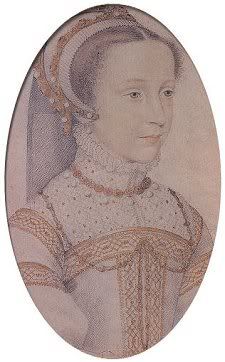
Emma Capet, Queen of Scots in an early Renaissance masterpice. It was part of a grand chronicle on the monarchs of Britain dedicated to king Henry II. Emma Capet in her time was renowned both for her beauty and her pleasant ways. King Ranald is to have fallen in love with her almost immediately.
The diplomatic coup was announced to the public in December. In January the princess of France arrived in Edinburgh and the wedding took place on the 2nd of February with the festivities continuing for two weeks. The climax was the three day tournament between the most renowned Scottish knights and the most noble warriors in Emma's retinue, which captivated the imagination of minstrels for years to come. Few people at that time realized that through this wedding Scotland would soon become involved in the deep internal strife of the realm of France...
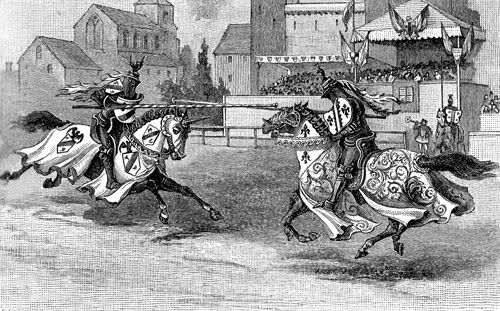
The "Grand Tournament of Edinburgh" of 1151 was in the end won by Gaston de Brezé, champion of Queen Emma. The event is to have made a profound impression on young king Ranald, who for his whole life would be inspired by the ideals of chivalry.
~Lord Valentine~
Kurt_Steiner: After this war it definitely looks like the Isle will need some time to recover. Whether England will ever recover it's dominant position however seems highly doubtful.
Ranald I "the Conquerer"
Born 1135 - Died 1183
Ruled 1140-1183
Ruled 1140-1183

The Regency Years
1140-1152
1140-1152
Part Six: A Monarch assumes Power
The Cast:
Ranald I, King of Scotland, Ireland and Wales
Robert Loarn, Earl of Morray
Edmund MacBrannain, royal councilor
Emma Capet, daugther of Geoffroy I of France
Catherina of Atholl, sister of Ranald I
Louis Capet, duke of Blois, uncle of Geoffroy I
The end of the war with England had come not a second to late for Scotland. Vast stretches of countryside where destroyed and commerce had been disrupted for years leaving many once prosperous trade places deserted and in decay. Furthermore the crown itself was virtually ruined. The grand expenses of the war, most of all the hiring of soldiers and mercenaries and keeping them in the field for so great an amount of time, combined with greatly declining sources of revenue had lead to an accumulation of debts on an unimaginable scale. The royal treasury had resorted to the common way of repaying loans by granting certain taxes and tools away for a certain time to it's debtors. In wartime this however was a policy of dubious quality since it reduced the crowns income even further. Therefore although already having granted away vast taxation rights for several years the crown at the end of the war still had some 200.000 Pounds of debts to repay. Faced with these enormous figures the council quickly came to the conclusion that extraordinary taxation was the only cure for this remedy. For this reason parliament was summoned to Edinburgh for July 1149.

A 15th century illustration showing several Scottish earls on their procession to parliament. Using 1149 as a precedent the Scottish monarch would increasingly use this institution as means to finance their costly foreign policy.
The session opened on 23 August with the Lord Treasurer Sir Collin Bruce delivering the opening address in the name of the king (this is by the way the first time chronicles mention a member of the Bruce family which would later feature so prominently in Scottish history). He called for parliament to give a subsidy on form of a 8th so that the grave damages of the war might be removed, order restored and thereby peace and prosperity return to the realm. The need for ready cash was especially stressed since there where reports of great insurrections in the Kingdom of Ireland, which would be lost if firm action was not quickly taken (in the end it would turn out that the rumors about an Irish uprising where greatly exaggerated and no serious threat to Scottish rule). It was then the turn of Lord Robert Loarn, earl of Morray, to give a formal reply for the lords assembled. It was one that surly did not please the crown. He began by thanking his "most dreaded sovereign" and his ministers for their glorious and swift conclusion of the war but rejected the crowns request for a subsidy as both "against the ancient customs and laws of this realm" and "indecent". While he expressed sympathy for the financial plight of the monarchy he pointed out that he and his peers where no less effected by the war. He famously concluded that it was against the laws of nature and God that "he who rules should prosper, while his subjects are left destitute". This speech according to legend infuriated the 14 year old Ranald so much that he personally replied to it in a passionate way pointing out that great part of the realm such as the Scottish Highlands or the Welsh Marches had been left completely unaffected by the conflict. Had he so often risked his personal security to face such ingratitude of his own subjects? He would have rather fallen in the struggle of a lost cause rather than to have to witness such a betrayal by his own people as a victor. Whether it was this speech which shamed the Lords into a new position or some backroom deal we do not know, but in the end parliament agreed though not to grant a 8th but at least a 10th as subsidy.
With the financial freedom of the crown thereby more or less restored again the next two years went without any major recored event. The next major event to occur was the death of the kings younger brother Ruadrí, Duke of Connacht in 1151. With his death his lands fell back to the king but since the crown lacked the necessary means to exploit them effectively the question who to grant these lands at once became imminent. On this issue it can also be said for the first time that Ranald, by now 16 years old, although on the paper still under the guidance of his regency, took his own line on the issue and managed to have his will. While most in the council favored carving up the estates between various magnates of the realm Ranald on his own initiative invested Edmund MacBranain, a faithful noble councilor and friend his late father Malcolm IV, with all the lands and honors of a Duke of Connacht. This was a clear signal to everyone that the regency was drawing to it's close.
This became even more apparent when the Queen mother Nualá died in December and the king announced that her place in the council would be left vacant, since "his royal Highness is sufficiently supplied with councilors and due to the ripeness of his years able to decide all matters of the realm". In fact the king had already been working for half a year on what would perhaps be the most fateful step in Scottish foreign policy ever. Having directly experienced the hardships of a war with England Ranald had come to the conclusion that the best way of securing Scotland's position in Europe, especially in view of the Holy Roman Emperors indirect intervention in favor of England in the last war, would be further strengthening the ties to France. By November he had reached a secret agreement for a double wedding alliance with the house of Capet. Ranald would marry Emma Capet, the daugther and only surviving child of king Geffroy, while Ranald's sister Catherine would marry the duke of Blois, Louis Capet, Geffroy's uncle, whose son Charles was the realms present heir presumptive.

Emma Capet, Queen of Scots in an early Renaissance masterpice. It was part of a grand chronicle on the monarchs of Britain dedicated to king Henry II. Emma Capet in her time was renowned both for her beauty and her pleasant ways. King Ranald is to have fallen in love with her almost immediately.
The diplomatic coup was announced to the public in December. In January the princess of France arrived in Edinburgh and the wedding took place on the 2nd of February with the festivities continuing for two weeks. The climax was the three day tournament between the most renowned Scottish knights and the most noble warriors in Emma's retinue, which captivated the imagination of minstrels for years to come. Few people at that time realized that through this wedding Scotland would soon become involved in the deep internal strife of the realm of France...

The "Grand Tournament of Edinburgh" of 1151 was in the end won by Gaston de Brezé, champion of Queen Emma. The event is to have made a profound impression on young king Ranald, who for his whole life would be inspired by the ideals of chivalry.
~Lord Valentine~
Last edited:



